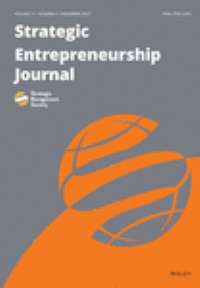与众不同?以手工艺为基础的营销活动以及独特性对营销活动成功的价值
IF 6.3
2区 管理学
Q1 BUSINESS
引用次数: 0
摘要
研究摘要独特性是手工艺的基本要素。在最佳独特性理论的基础上,我们研究了手工艺企业、独特性和众筹绩效之间的关系。通过对 10,915 个手工艺品众筹项目和 429,290 个非手工艺品众筹项目进行抽样调查,我们发现,手工艺品众筹项目具有更高的独特性,但通过独特性获得的成功率较低。此外,风险指数较高的手工艺活动具有较低的独特性,战略广度较高的手工艺活动具有较高的独特性,认知复杂性较低的手工艺活动具有较高的独特性。研究结果对手工艺创业者利用独特性以及通过战略创业要素--战略广度和认知复杂性--降低对独特性认知的价值具有重要意义。我们发现,提高手工艺创业企业的独特性会降低众筹活动的绩效。此外,我们的研究结果表明,风险较高的手工艺活动的独特性水平较低。相反,我们发现,具有较高战略广度和较低认知复杂度的手工艺品众筹活动具有较高的独特性。这些发现对于手工艺创业者如何在众筹背景下最好地展示其创业项目的最佳实践具有重要意义。具体来说,我们的研究结果表明,基于手工艺的创业企业可以通过降低其活动的独特性水平来实现更好的众筹业绩。本文章由计算机程序翻译,如有差异,请以英文原文为准。
Mix with the crowd? Craft‐based campaigns and the value of distinctiveness in campaign success
Research SummaryDistinctiveness is an essential element of crafts. Building on optimal distinctiveness theory, we examine the relationship between craft‐based ventures, distinctiveness, and crowdfunding performance. Using a sample of 10,915 craft campaigns and 429,290 non‐craft campaigns, we find that craft‐based campaigns have higher distinctiveness but realize lower success through distinctiveness. Additionally, craft‐based campaigns with a higher risk index have lower distinctiveness, those with higher strategy breadth have higher distinctiveness, and those with lower cognitive complexity have higher distinctiveness. The findings have implications for crafts‐based entrepreneurs in leveraging distinctiveness and the value of lowering perceptions of distinctiveness through elements of strategic entrepreneurship—strategy breadth and cognitive complexity.Managerial SummaryOur study aids craft‐based entrepreneurs in presenting their ventures in crowdfunding contexts. We find that increasing the distinctiveness of craft‐based ventures results in lower crowdfunding campaign performance. Additionally, our results indicate that craft‐based campaigns that have higher risk have lower levels of distinctiveness. Conversely, we find that craft‐based campaigns with higher levels of strategic breadth and lower levels of cognitive complexity exhibit higher levels of distinctiveness. These findings have important implications regarding best practices related to how craft‐based entrepreneurs can best present their ventures within crowdfunding contexts. Specifically, our results indicate that craft‐based ventures can realize better crowdfunding performance via lower levels of distinctiveness within their campaigns.
求助全文
通过发布文献求助,成功后即可免费获取论文全文。
去求助
来源期刊

Strategic Entrepreneurship Journal
Multiple-
CiteScore
11.10
自引率
1.60%
发文量
31
期刊介绍:
The Strategic Entrepreneurship Journal is a research journal that publishes original work recommended by a developmental, double-blind review process conducted by peer scholars. Strategic entrepreneurship involves innovation and subsequent changes which add value to society and which change societal life in ways which have significant, sustainable, and durable consequences. The SEJ is international in scope and acknowledges theory- and evidence-based research conducted and/or applied in all regions of the world. It is devoted to content and quality standards based on scientific method, relevant theory, tested or testable propositions, and appropriate data and evidence, all replicable by others, and all representing original contributions. The SEJ values contributions which lead to improved practice of managing organizations as they deal with the entrepreneurial process involving imagination, insight, invention, and innovation and the inevitable changes and transformations that result and benefit society.
 求助内容:
求助内容: 应助结果提醒方式:
应助结果提醒方式:


